Year: 2015
One-Sided Discourse
In her Trainwreck review N.Y. Times critic Manohla Dargis says Amy Schumer is her “kind of superhero because she stops haters dead,” haters defined in this context as chauvinists who mouth “hateful slurs” by saying this or that woman isn’t “thin enough or pretty enough.”
I suffered slings and arrows along these lines a few months ago but that train has left the station. I fell in love with Schumer after seeing Trainwreck because I was persuaded that the movie version of “Amy” is who Schumer really is deep down, and that realization touched me like very few comedies have in my entire life. I’ll never say a word against her again. But without disputing that it’s uncool to throw cruel comments around or that Schumer’s 12 Angry Men riff was an on-target parody of male sexist attitudes, let’s take two steps back and examine Dargis’s brief.
By saying that it’s hateful for men to judge women for their looks, Dargis is addressing only half of the activity that happens worldwide on a daily basis. As men have regarded visual female allure as a major deal for many, many centuries, I doubt if this trait is going to disappear any time soon. The sin, if I correctly understand Dargis and the haters who were after my blood last February, is discussing these judgments in a public forum. Why? Because it hurts. And because such judgments are never conveyed privately when a guy isn’t interested in pursuing a relationship with a woman — he just makes up an excuse of some kind, not wanting to hurt anyone’s feelings.
Friends of Trainwreck #2
From Manohla Dargis’s N.Y. Times review: “Amy Schumer is my kind of superhero — she stops haters dead. As fans of her Comedy Central show, Inside Amy Schumer, know, there’s almost nothing that anyone can say about women, her included, that she hasn’t already said herself. Her powers of deflection are the perfect approach in a neofeminist moment in which women are calling out sexists, sometimes against vicious pushback. Think that she’s not thin enough or pretty enough? She intercepts hateful slurs like those and turns them into ferocious comedy gold that exposes chauvinism as the absurdity it is. She can’t be stereotyped away as a sourpuss who just needs to chill out, lie back and smile. She’s already smiling, and she’s killing it, joke after joke.
“In Trainwreck, Ms. Schumer plays, well, Amy, a more vanilla version of one of her comically flawed women, who aren’t as remotely together as they think or may appear to be. The movie, which was directed by Judd Apatow from her script, is often extremely funny, even if it never approaches the radicalness of her greatest, most dangerous work. Mr. Apatow’s talent as a movie director is opening up a space on screen in which comic performers (and some total stiffs) can be effortlessly funny together. In Trainwreck, he creates a roomy, comfortable vehicle stuffed with second bananas (both professional zanies and guest-starring squares), who support Ms. Schumer as she tosses out jokes, pops her eyes, deploys her deadpan and shows off her gift for old-school physical high jinks, often in heels and minis.
Where’d You Go, Johnny Concho?
This may not pass muster with traditional Western devotees (i.e, readers of Cowboys & Indians) but arguably one of the most influential westerns ever made is Johnny Concho (’56), a stagey, all-but-forgotten little film that Frank Sinatra starred in and co-produced. For this modest black-and-white enterprise was the first morally revisionist western in which a big star played an ethically challenged lead character — i.e., a cowardly bad guy.
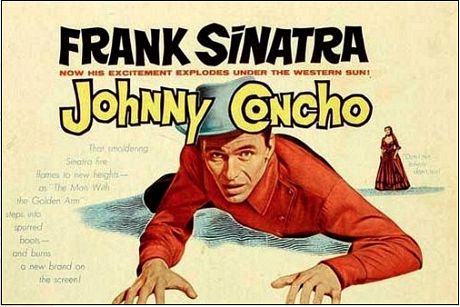
The conventional line is that Marlon Brando‘s One-Eyed Jacks was the first western in which a major star played a gunslinging outlaw that the audience was invited to identify or sympathize with — a revenge-driven bank robber looking to even the score with an ex-partner (Karl Malden‘s “Dad” Longworth) who ran away and left Brando’s “Rio” to be arrested and sent to prison.
This opened the door, many have noted, to Paul Newman‘s rakishly charming but reprehensible Hud Bannon in Martin Ritt‘s Hud two years later, and then the Spaghetti westerns of Sergio Leone (beginning with ’64’s A Fistful of Dollars) and particularly Clint Eastwood‘s “Man With No Name.”
But before One-Eyed Jacks audiences were presented with at least three morally flawed western leads portrayed by name-brand actors. First out of the gate was Sinatra’s’s arrogant younger brother of a notorious gunslinger in Concho. This was followed in ’57 by Glenn Ford‘s Ben Wade, a charmingly sociopathic gang-leader and thief, in Delmer Daves‘ 3:10 to Yuma. And then Paul Newman‘s Billy the Kid in Arthur Penn‘s The Left-Handed Gun (’58).
False Equivalency
I’ve always loved this One, Two, Three gag. Billy Wilder‘s 1961 comedy screened last Sunday at the American Cinematheque Egyptian, but I couldn’t attend because it was projected in 35mm. A friend swears it looked great but I’m not changing my DCP-only policy because of an exception to the rule. 94% of the time 35mm is the pits. Okay, 90% of the time.
Keep It Going
Five and a half weeks after opening theatrically, Bill Pohlad‘s Love & Mercy has announced its home video & streaming plans. 40 days hence (8.25) it’ll be available on Digital HD (what does that mean exactly? Amazon or Vudu or what?). And then on 9.15 it’ll arrive on Bluray, DVD and On Demand. At least more people will catch it this way, and those Academy and guild members who still haven’t watched it will receive screeners in the mail. One way or another it’ll gradually sink in that (a) this is the leading token Best Picture contender from the indie ranks, (b) Paul Dano and John Cusack are the Bobbsie Twins of the 2015 Best Actor race, (c) Pohlad deserves an attaboy Best Director nom for transitioning so successfully to the DGA ranks, and (d) Oren Moverman‘s screenplay deserves a Best Original Screenplay nom. Really.
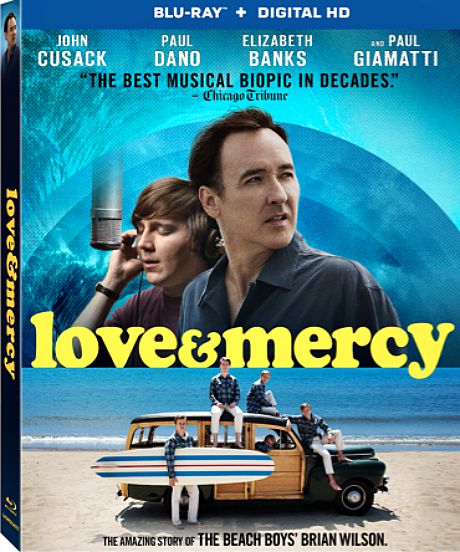
Demolition Deep-Sixed, Bumped Into ’16
Until today it looked like Jake Gyllenhaal would give noteworthy performances in three major 2015 films, portraying a troubled boxer in Antoine Fuqua‘s Southpaw, a mountain-climber in Everest and an investment banker recovering from the death of his wife in Jean Marc Vallee‘s Demolition. My insect antennae were telling me, actually, that Jake’s Demolition performance (grieving widower + romantic rebound) might be his best shot at award-season accolades. I’ve been too lazy to read the Demolition script, of course, but maybe.
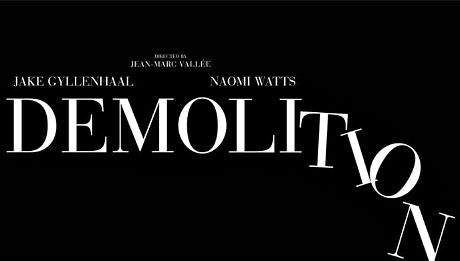
It made sense that the solemn-sounding Demolition would open later this year and maybe kick up a little dust. Vallee’s Dallas Buyer’s Club and Wild were in the derby in 2013 and ’14, respectively, so it added up. But then Fox Searchlight, the distributor of Demolition, never announced a 2015 release date, and this made some of us go “hmmm.” Now the other shoe has dropped. Demolition has been drop-kicked into a 4.8.16 release. Au revoir, Telluride and Toronto and all the giddy award-season razmatazz. Hello, April opening and some people paying respectful attention but with the electric-charge element sorta kinda missing. The film has now been officially classified as…well, let’s not jump to conclusions.
The Authentic Return of One-Eyed Jacks
How many times have I written about the ongoing visual tragedy of Marlon Brando‘s One-Eyed Jacks? For too many years the 8-perf VistaVision splendor of this classic 1961 western, shot by Charles Lang, has been unviewable due to the film rights having lapsed into public domain, which has resulted in several atrocious-looking DVD dupes (largely sourced from a decent-looking Paramount laser disc issued in the ’90s) flooding the market. Well, this nightmare is finally at an end with Universal and Martin Scorsese‘s The Film Foundation having recently agreed to join forces on a 4K “restoration” of One Eyed Jacks.
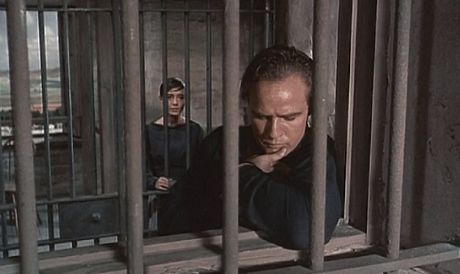
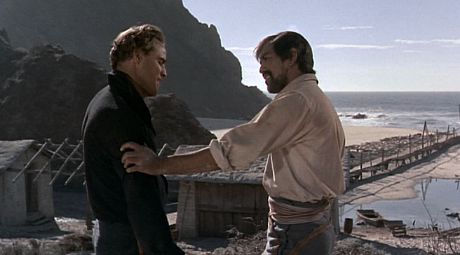
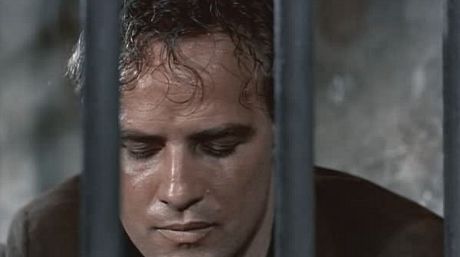
A Universal Q2 report divulged the basics earlier this month, and this morning Film Foundation managing director Jennifer Ahn confirmed that the One-Eyed Jacks project is a definite go.
Yes, Universal and not Paramount, the original distributor. I’ve assumed all along that Paramount had retained rights but apparently not. The rights issue turned out to be “much more complicated than it seems,” Ahn says, “but ultimately we figured out that they belonged to Universal.” The Q2 report divulged that Universal and the Film Foundation have “begun film element research and scan tests” with an assessment report to follow, and then it’ll be off to the races. If all goes well (and it should) the One-Eyed Jacks Bluray will probably be released sometime next year.
Murnau’s Head, Einstein’s Brain
If the ghost of F.W. Murnau could provide a quote about the thieves who dug up his coffin and stole the head, it would be something along the lines of “little minds will have their distractions.” I immediately thought of Thomas Stoltz Harvey, the pathologist who removed the brain of Albert Einstein during an autopsy on or about 4.18.55 (i.e., the day after Einstein died). The great Errol Morris has long wanted to make a fictitious riff called Einstein’s Brain, and I was thinking how Morris would have fun with a doc about the Murnau beheading, if the morons behind the deed are found. At the very least a few more people will now be buying the Sunrise Bluray.


(l.) Sunrise director F.W. Murnau, who died in a car accident near Rincon Beach on on 3.11.31, during a drive up to Santa Barbara (r.) Albert Einstein.


